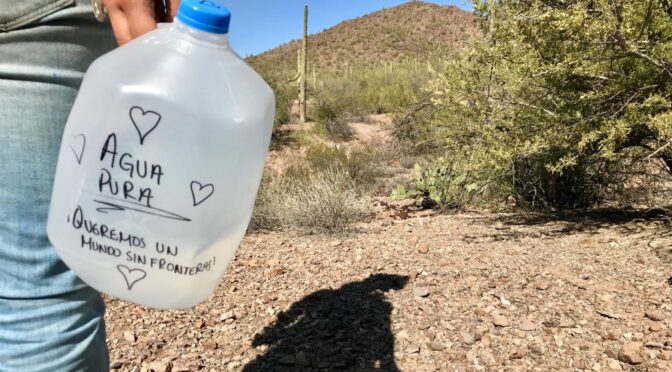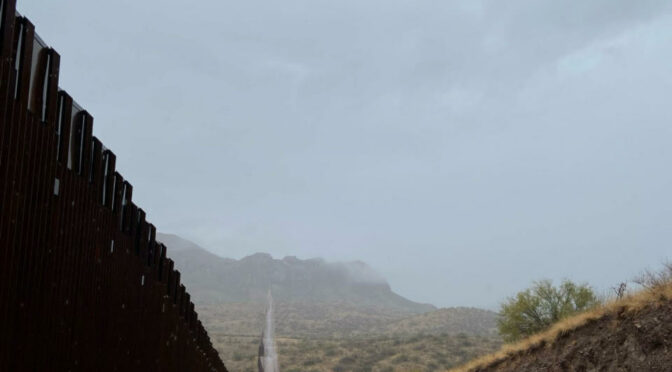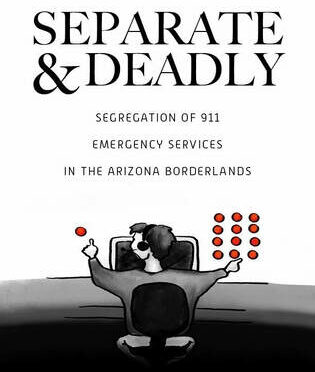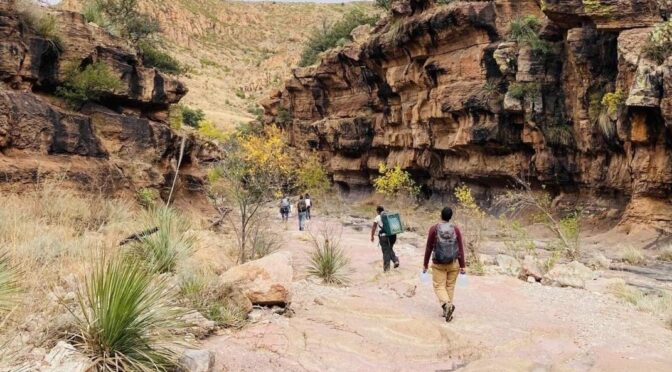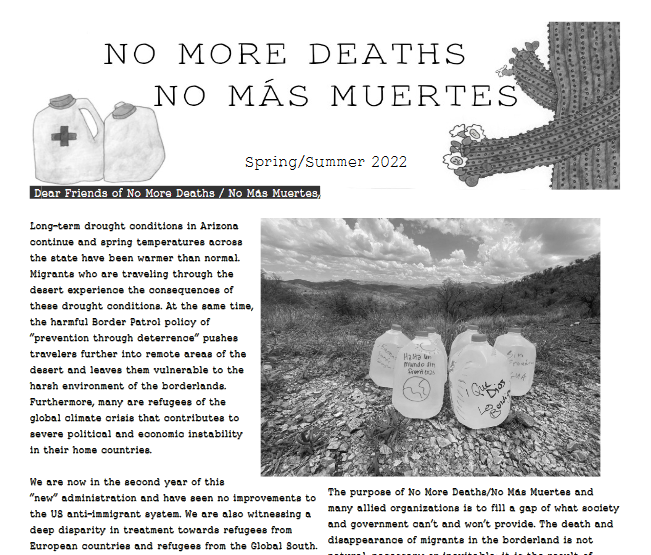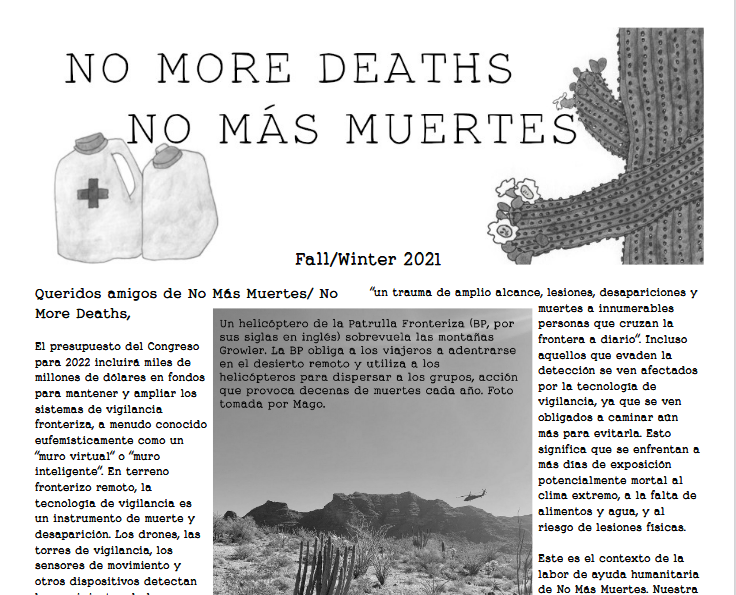Want to receive email updates? Join our mailing list here
All posts by No More Deaths
Border Patrol Neglects Asylum Seekers in Winter Storm, Threatens Aid Workers with Arrest
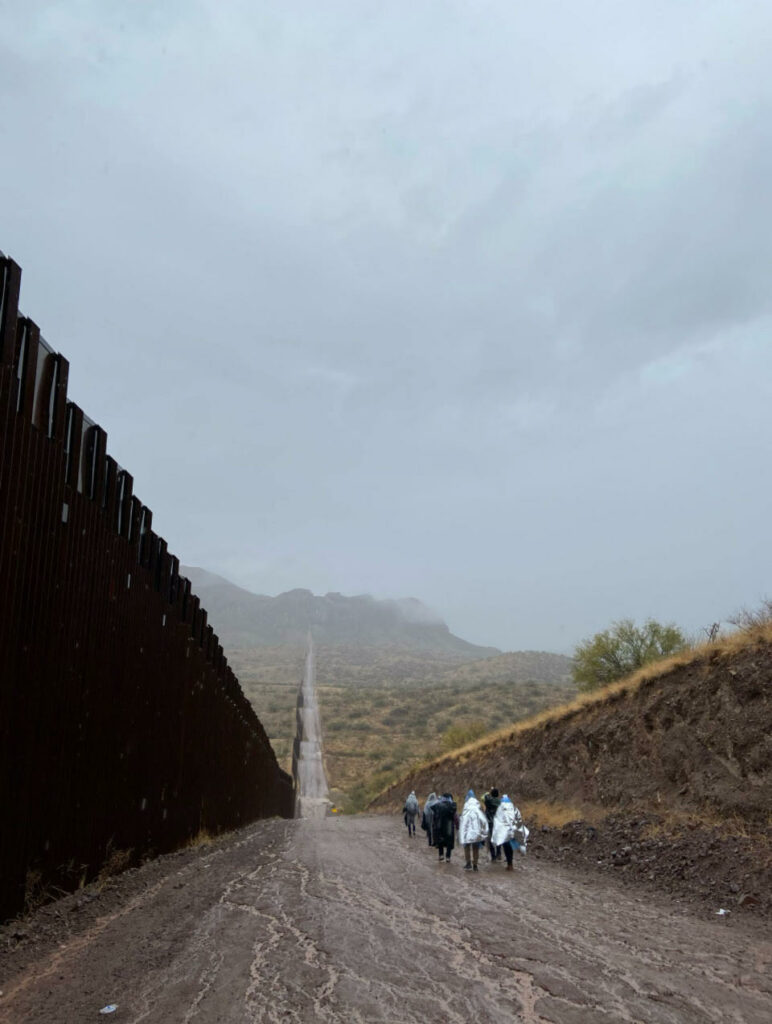
SASABE, Arizona – Last night, humanitarian aid workers scrambled to triage and support 300 asylum seekers stranded along the border wall east of Sasabe, Arizona. A winter storm blew in, dumping rain upon the hundreds of men, women, children, and babies left without adequate shelter in the remote location. Recognizing the urgency of the situation, volunteers notified Border Patrol that they would be driving asylum seekers to the Sasabe substation to be processed, to get them out of the life-threatening cold.
Volunteers were told that this was illegal. Meanwhile, Border Patrol agents refused to send personnel to the area, citing road conditions and limited space in vehicles as the reason for their lack of response. They advised volunteers to call 911 if there was a medical emergency.
The message from Border Patrol was loud and clear: you’re on your own.
Despite the constraints of providing humanitarian aid in a place where cell phone service is limited and the nearest ambulance is two hours away, humanitarian aid volunteers did place multiple calls to 911. Through the rainy day and the frigid night, no emergency services arrived. “Without us volunteers everybody would have died. Everybody would have died,” one volunteer responding to the situation said. “With no tarps, no rain gear, no food, and no water, 300 adults, elders, and children could have died from exposure. We were a group of 8-15 volunteers triaging 300 people, trying to prevent hundreds of deaths. We cannot keep this up. We are not meant for this. We need bigger resources and responses.”
There are still hundreds of people stranded along the wall, waiting to be picked up by Border Patrol.
NEW REPORT: “Separate and Deadly” Reveals Discriminatory 911 Call System in US/Mexico Borderlands
TUCSON, Arizona – On November 14th, No More Deaths released Separate and Deadly: Segregation of 911 Emergency Services in the Arizona Borderlands. The report is the latest installment of Disappeared, a four-part series that examines Border Patrol’s role in the crisis of mass death and disappearance in the U.S.-Mexico borderlands.
Separate and Deadly analyzes the Pima County Sheriff’s Department’s emergency response system and the segregation of 911 calls in the border region. The findings of the report shed light on a discriminatory system in which vastly different responses are allocated to callers based on their perceived citizenship status. For people migrating through the region, their distress calls to 911 are customarily transferred to Border Patrol – an agency that has already demonstrated a deadly negligence when it comes to emergency response and rescue.
From the report:
“In March 2018, a man contacted 911 eleven times over the course of ten hours. He was lost and alone. As the hours passed, his condition clearly deteriorated, and his voice began to fade. It appeared that Border Patrol was not actively searching for him… Pima County dispatchers continued to transfer his call to Border Patrol every time he called… The county’s own Search and Rescue team was never notified, and the county never activated a search for him. Eventually the man stopped calling. The outcome of his case is unknown.”
The No More Deaths team reviewed thousands of 911 calls and took testimony from humanitarian aid volunteers, in addition to other relevant data sources. In 99% of the calls where the caller was presumed to be undocumented, no intake or assessment was conducted, in 68% of the calls the dispatcher lacked fluency in Spanish to be able to communicate effectively and 50% of the callers were given no notice before being transferred to Border Patrol.
“Not only is call segregation based on presumed immigration status unlawful, the consequences of such practices are deadly,” says Parker Deighan, one of the report’s contributors. “The findings of this report raise serious questions about the county’s complicity in the ongoing crisis of death and disappearance.”
In 2023 alone, the remains of 175 people have been found in Arizona. Countless more remain disappeared.
PERSONNEL COORDINATOR (30 hours/week)
Apply By: September 29, 2023
Start Date: October 23, 2023
Apply Here: https://form.jotform.com/231497966319168
In recent years, No More Deaths has grown from an all-volunteer organization to incorporate paid positions for critical tasks that are difficult to fill with volunteer labor. Due to the non-hierarchical structure of No More Deaths, this position is not solely responsible for all HR issues but instead is responsible for coordinating volunteers and staff to make sure HR and personnel issues are handled. The personnel coordinator is responsible for organizing systems to support NMD staff, ensuring that staff is meeting expectations, and coordinating responses to conflicts or issues involving staff.
Job Responsibilities:
- Schedule and organize quarterly personnel meetings to discuss any organization and personnel-related updates.
- Track employee contract end dates and renewals along with facilitating those processes.
- Managing hiring processes for all working groups and ensuring that they are happening in a timely manner.
- Communicate with bookkeepers about payroll updates, and new hire/exit updates.
- Met with new hires to complete all necessary paperwork and a new-hire orientation onboarding.
- Manage health & dental communication with our insurance broker.
- Manage staff feedback processes on a quarterly basis.
- Coordinate meetings with staff to share feedback given through the quarterly feedback process.
- Coordinate meetings with employees (upon request) to ensure they are supported and getting their needs met.
- Coordinate the completion of a personnel manual by drafting policies and presenting them to the organization for approval.
- Adjust policies as the needs of the employees and organization arise.
- Facilitate HR needs and grievance/accountability processes – direction involvement is expected at first and if a third-party service is needed the Personnel Coordinator is expected to organize this.
- Organize the monthly organizational-wide meetings – handle most communications & logistics.
- Participate in the No More Deaths Grievance Committee for a minimum of 4 hours per month.
Preferred Qualifications:
- Strong communication and organizational skills.
- Ability to manage multiple projects and keep track of many moving pieces.
- Conflict mediation experience and experience with transformative justice models.
- Independently able to identify issues and come up with innovative solutions.
- Familiarity with or a willingness to learn about Arizona labor laws.
- Experience with Microsoft Office programs and ability to learn new technologies (if not familiar) i.e. Nextcloud/Jotform.
- Strong meeting facilitation skills.
- Bilingual in English/Spanish.
Contract Conditions:
- Term: 12 months
- Hours: 30 hours a month, $20 an hour (pre-tax)
- Work phone and computer provided
- Mostly remote (90%)
- Must be based in Southern Arizona and able to attend monthly meetings in Tucson.
No More Deaths is an equal-opportunity employer and strongly encourages applications from people of color, persons with disabilities, women, and LGBTQ+ applicants. Individuals with personal ties to the border or who identify as coming from an affected community are especially encouraged to apply. Thanks for your interest in this position!
Summer 2023 Newsletter
Want to receive email updates? Join our mailing list here
Winter Newsletter 2022
Caring for the Deceased, Caring for the Living
by Bees, Desert Aid worker
from the Winter 2022 newsletter – read it here!
I have mixed feelings about writing this piece about death in the desert.
Our organization is named No More Deaths; our stated mission is “to end death and suffering in the Mexico-US borderlands.” Death is central here, I know. But so much has already been written about the US government’s choice to use the desert as a weapon of genocide, and journalists have produced copious portraits of individual volunteers coming across deceased people at the border.
Let me first tell you, if I may, about the delight.
Let me tell you about getting my ass kicked in pick-up basketball by teenagers who had been walking through the desert for weeks. Let me tell you about how many times I’ve explained “Yes, you have correctly identified the English word for chicken, but Chicken of the Sea is not, in fact, chicken.” Let me tell you about meeting people who hadn’t had access to clean water in days and telling them (truthfully) that they smelled better than the ragtag crew of punks dropping fresh gallons and food around the Altar Valley.
Let me tell you about a man who had spent nearly a month trying to get through the Sonoran Desert on foot, whose eyes filled with tears when he spoke about the desert because to him the plants, the birds, the sunrises blossoming across the mountains, were all so wonderful. “The desert is beautiful,” he said.
In August, No More Deaths volunteers working around Arivaca found the remains of four recently deceased migrants. Death is central here, and yet none of the longer term volunteers can recall finding so many people in so short a time in this particular corridor. The desert is wonderful and terrible all at once.
Let me tell you, if I may, about the care and compassion of people in the desert.
One man explained to me why it’s difficult to report deceased people on the trails, even to humanitarian aid workers. “It’s dangerous, you know? If I tell somebody I saw a body, maybe they’ll decide I’m responsible for it. Maybe they call the police.” And then, risk be damned, that man proceeded to tell me where he saw someone who had died and made me promise that we would go look for that person. In fact, undocumented people reported three of the deceased people that we found*, ensuring that we could recover them quickly and help their families find a measure of closure.
When it would be easy to prioritize rage and anguish, I see volunteers prioritize care. People who have had traumatic experiences with law enforcement hike for miles with police to ensure a person is retrieved quickly and with dignity. Volunteers take photos of the surrounding landscape so families can see where their loved ones passed away. Atheists place flowers and pray. Cynical feelings arise in me and I wonder if these gestures are useful. Then I speak with a relative of one of the men who died.
I was in the group that found your loved one. We picked flowers and prayed for him, and for your family.
We pray for you too. Please, if you can tell me, what was it like where he died?
It was peaceful and beautiful. I know that sounds strange, but it was.
That’s good. That is helpful to hear.
Please let us know if there is anything we can do for your family.
Thank you for telling me. Thank God my cousin was found.
What the magazine profiles do not describe is that when we find people in the desert, we care for the people who walk on these trails, for their families, and for ourselves. They care for us in return, sharing food with us, sharing stories with us, asking how they can help us, and praying for us (forgiving any non-believers). Volunteers forgive each other for speaking clumsily and imprecisely, for responding from trauma and anger, for not doing and thinking everything with absolute perfection. One particularly hard day I share a feeling – that these people died close to where we leave gallons and it’s hard not to feel haunted by that – and no one shames me for it.
My fellow volunteers know the truth as well as I do. We could drop hundreds of gallons of water on every trail in the desert, and people would still die. They die because of settler colonialist violence, extraction economies, and imperialism. Because Border Patrol agents are paid to scatter and terrorize and kidnap people, instead of help them. Because horror is central to US border policy and no quantity of water can wash the blood off the hands of the people who write it. Because of a lack of care that is antithetical to so many of us in the desert.
I once met someone who carried a member of his group on his back so she could make it through alive. Another who assumed tremendous personal risk to ensure ailing people could receive urgent medical treatment. Another who reported a deceased person with the full knowledge that he might be blamed for that person’s death. I never found a way to contact the man who reported the deceased person directly to us to assure him we kept our promise, but I did run into a group who had walked the same trail. They were relieved someone cared enough to search, and then asked if we knew his name or where he was from. They intended to pray for him and his family. I told them we went to recover the body and saw that police treated the person with respect, and they asked me if I was okay.
Major publications construct a landscape of ceaseless adrenaline rushes – guides abandoning groups, cartels exacting exorbitant sums from the destitute, brutality of Border Patrol agents, death on the trails – and it feels like strange pathos porn, bordering on romanticization of the worst of humanity. What I would like to offer is that there is also care here, and I have seen the best in people.
I do not ignore or erase the despair in this work, nor do I pretend away the violence. Simply: I agree with the man who told me the desert is beautiful. If you have ever lost someone close to you then you know what this feels like. Your loved one is dead, light shines through the trees, a baby giggles in your arms, the world continues to turn, and the person you loved most in the world is dead. I was present on three occasions when we found people. There were wildflowers everywhere, birds singing sweet and clear around us, creeks flowing gently in the background. We cared for the deceased, and we cared for the living.
This is what I ask us to remember when we read other stories about the border, when despair and doubt settle in to stay for a while, when the challenges feel insurmountable and endless: many awful stories are true, and so are many wonderful ones. Terrible things happen, and we can provide comfort in spite of it all.
Death is central here, and care is all around.
Author’s note: I am a white settler who grew up in the Great Lakes region, not the desert. This piece is written from that perspective, and I intend to represent no one’s experiences but my own.
*Undocumented people who witness a deceased person on the trails cannot easily report to law enforcement without facing apprehension, deportation, and other legal repercussions, as well as potential scrutiny for that person’s death. For this reason No More Death’s Missing Migrant Hotline and other search and rescue hotlines are integral to finding and recovering people quickly. For more information on how Border Patrol and other law enforcement agencies fail to recover missing people and even prevent their recovery, visit http://www.thedisappearedreport.org/.
KTT Public Statement
To the No More Deaths community of supporters, clients of Keep Tucson Together, and the community of Tucson:
Effective July 1st, 2022, Keep Tucson Together (KTT), the free legal clinic headed by attorney Margo Cowan that offers advice and assistance for immigration cases, will no longer be part of No More Deaths (NMD). The separation is supported by the Unitarian Universalist Church of Tucson (UUCT) which provides NMD with fiscal sponsorship. In this statement, the name NMD and the term “we” refers to the majority of NMD that will continue to fulfill our mission, and does not include KTT or those NMD volunteers who opposed the separation. We are sharing details of the separation out of a commitment to transparency and accountability to all affected and the community.
Last summer, multiple families assisted by KTT came to NMD and showed evidence that their cases had been mismanaged. We assessed the information that was shared with us and found there to be a troubling pattern of misleading information, lack of communication and disrespectful behavior. The stories shared by the families are devastating and we honor their bravery in coming forward. After several requests for information and exhaustive efforts to hold KTT accountable internally, we have decided to no longer be associated with services provided by KTT.
When the families came forward, members of KTT and several long-term NMD volunteers refused to believe any wrongdoing had occurred. The repeated gaslighting and condescension were offensive and traumatizing for the affected families. The decision to dis-associate from KTT was further validated by persistent disrespectful treatments of NMD staff and volunteers during this process by Margo Cowan, other members of KTT and some individuals in NMD. These interactions brought to the forefront deep-rooted white supremacy in NMD that has been present since its founding and which we must continue to confront.
We acknowledge the essential services that KTT has offered the undocumented people in Tucson. We hope that as an organization independent from NMD, KTT will change their practices to prioritize client communication, informed consent, and a responsible caseload.
We are unable to speak on the subject of the future operations of KTT. To inquire about their continued services please contact KTT by phone at (520) 623-4084 or in person at the KTT office at 730 S Osborne Ave in Tucson.
If you have further questions, please refer to our website for a list of frequently asked questions:
https://nomoredeaths.org/ktt-separation-faq/

